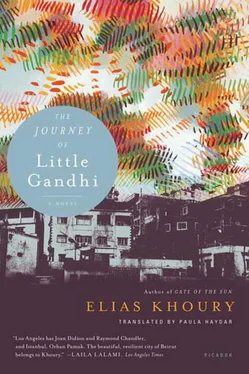Alice went inside and Zaylaa didn’t move from his spot. Actually, he came in at two in the morning and started drinking. Alice didn’t dare ask him anything, for he had a reputation for beating up girls. All the girls were scared of him because he’d beat them up. She waited for him to tell her, but he didn’t. She asked him in a soft voice. He laughed and asked her to come home with him. She went. It was a big house full of mirrors. The electricity was out. He lit a candle and asked her to massage his back for him. He took off his clothes, laid down on his stomach on his big bed, and she began massaging him. He asked her to take off her clothes; she took off her clothes. She took some cream and massaged his back. Then she heard him snoring, so she left him and went to another room and fell into a sound sleep.
The next day, around four in the afternoon, Alice passed Faysal’s Restaurant and saw Little Gandhi sitting on a chair next to the newsstand.
He told her his daughter was back, and he was going to buy a present to take that evening to Zaylaa. He said he was going to buy him a pipe.
Alice tried to tell him Zaylaa didn’t do anything, that he had nothing to do with his daughter’s return.
Gandhi was set on buying the pipe and told her to come by in the evening before going to work so they could go together.
Suad came back.
Gandhi was sitting in his usual spot, his wooden box beside him, newspapers stacked around him, alongside the newspaperman who slept all day. He saw his wife coming to say the girl had come back, their daughter was home, so he ran off in a hurry.
At home he saw his daughter. She’d just come out of the shower, her long, black, curly hair spread out on her back. Her eyes had gotten bigger, more creases around them, and she was thin as a pole, trembling. She sat down next to her father, hugged him, and fell into a long crying spell and told him.
She said she went to their old house in Nabaa. She said she didn’t find the house. She said they arrested her and took her to a shack. She said one of them started beating his head against the wall. She said they let her go, they put her on a truck, and in front of Salomi Circle one of them threw her on a garbage heap. She said she stayed on top of the heap all night, that she was afraid of the rats. She said a man came in the morning, and when he saw her he ran and started to scream. She said she got up from the pile of trash and ran, she said no one stopped her, she walked from Sin al-Fil to Hamra. She said she lost one of her shoes, so she walked half-barefoot. She said she wanted to sleep. She stopped talking.
Gandhi tried to get her to explain, but he couldn’t understand anything.
His wife, who stood there listening to the girl without opening her mouth, yelled at her husband.
“The girl’s finished. Your daughter’s a lost cause, man, get on with your work, go.”
Gandhi. couldn’t get up on his feet. He looked around, scared. He glanced back and forth from his wife to his daughter, cleared his throat, and didn’t say anything.
He stood up and told his daughter to get dressed. She didn’t move. Her mother stood her up, dressed her in her long blue dress, and Gandhi held her hand and took her to the hospital, to Doctor Atef’s clinic. It was full of people. Gandhi sat his daughter down and approached the nurse. She looked at him as if she didn’t know him.
“Please.”
“Do you have an appointment?” she asked him.
“No.”
“Sorry. Write your name and take an appointment, right now it’s impossible, the doctor is all booked up.”
“Please,” Gandhi said in a somewhat hoarse voice. “I beg you, just tell the doctor, tell him Gandhi is dying, tell him and see.”
“I’m sorry. The doctor only takes patients with appointments.”
At this point Little Gandhi started screaming. No one had ever seen him scream before. This Little Gandhi had never raised his voice his entire life. Even when Spiro with the hat attacked him and hit him, he didn’t open his mouth.
“The woman is a liar,” he said. He took the blows to his face and walked away.
Gandhi didn’t understand then what had happened, he was still a young man, working in that restaurant, waiting for Spiro with that woman while they occupied his bed and his attic room. Gandhi never came close to the woman. He’d stay downstairs, put up the tables and chairs, and mop. When Spiro attacked him and hit him, things got all mixed up for him.
He saw the woman coming downstairs. Spiro had left the restaurant after putting the black beret on his bald head. He opened the door and spit on the sidewalk, as he always did, and he saw the woman coming downstairs. He was leaning against the wall smoking a cigarette. The woman was wearing a see-through nightgown, her huge breasts swaying as she came down the stairs, and she was rubbing her eyes with her hands. He went up to her and held her breasts and heard the moans he listened to while waiting for them downstairs, mop in hand. Then he woke up. Before he woke up he saw everything had turned red. The woman was red, the floor was red, and he was red. Her sighs filled his ears and rang in them. He woke up to find himself sleeping on the chair, the lights still on in the store, the floor covered with water, and not a soul around.
The next day Spiro came and hit him. He didn’t say why he was hitting him. He slapped him in the face and didn’t go up to see his lady. Gandhi didn’t scream or even open his mouth. He decided to leave the restaurant, and he did.
As for that day in the hospital, he shouted out loud, as if he were barking like a dog, and so Doctor Atef came running out.
“What’s going on, Zeina?”
The nurse pointed to Gandhi.
“Please, Doctor, I beg you, I’m going to die.”
“Come in, come in,” the doctor said. “But stop shouting.”
He grabbed his daughter and pushed her into the examining room. There were three women in there, so the doctor took Gandhi to a side room.
“Wait for me three minutes, three minutes, I’ll be with you.”
Gandhi waited, and Suad waited. The doctor took her into the examining room.
“What’s the story?” the doctor asked.
“Examine her, please, she disappeared for three days, I beg you, I’ve lost my honor, my reputation, I want to know.”
“Shut up,” said the doctor.
He sat the girl in a chair and lifted her skirt over her thighs.
“Get out,” the doctor said.
“No, I won’t go, I want to see.”
The doctor examined her for a few seconds, then looked at Gandhi.
“Congratulations, sir. Your honor and reputation are intact. She’s still a virgin.”
The girl didn’t open her mouth; she was unconscious.
“Now tell me the story,” Doctor Atef said.
Gandhi told him. “The medicine isn’t available. She should take four pills every day, you know the situation, there’s no medicine.”
The doctor took the prescription and read “Sordinol.” No problem, he said, wrote her a new prescription, and said she’d be all right, God willing.
She didn’t get better. She’d take the pills and become lethargic, as if she’d been hypnotized. The only person she’d talk to was Abu Saeed al-Munla. He’d be sitting in front of his store and invite her to come drink some yogurt. He’d run to Malku’s store and buy her a bottle, and say to her, “Blessed one.” Suad would stand in front of his store a long time while he talked to her and waited for a sign. Abu Saeed al-Munla said he was waiting for a sign from that girl. “These are the ones, these are the ones.” When Malku the Assyrian would ask him what he was talking about, Abu Saeed would say he doesn’t understand, these are the ones God has blessed and taken to see what we don’t see. We don’t see, and Abu Saeed would give his theory about Beirut. Beirut is an island, he’d say. An island asleep in the sea, asleep atop a ferocious beast, and every seventy years the beast gets restless and the city is turned upside down, and the more it gets turned upside down, the closer it comes to the end. Seven times the beast turned over and so did the city. Now we’re in its eighth topple. Abu Saeed said Mihran Efendi, the Turk, he was the one who told him these stories, when he was a child. Mihran Efendi was the only Turk who refused to leave Beirut after World War I. He was in love. He came by foot from the Suez Canal to Beirut, only to find that his sweetheart had gotten married. He stayed in Beirut and decided to wait for her, then he became a Beiruti himself. Beirut makes Beirutis out of everyone. Mihran Efendi, who became a shipping contractor, was the first to predict the disaster. He used to say Beirut was a sea animal — you love it the way you love animals. A city without a history, it turns upside down, its whole history is that it turns over on its belly and starts everything rolling along.
Читать дальше












